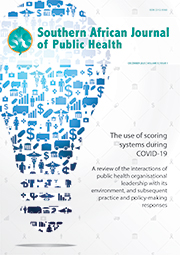Research

The COVID‑19 pandemic and mask-wearing in Africa
Abstract
Background. Like the rest of the world, most West African countries have put strategies in place to fight the COVID‑19 pandemic in progress. Among several strategies adopted is that of obliging people to wear a mask in public areas and within communities, which is not without risk.
Objective. To attract the attention of health authorities to the risks of the widespread use of masks by the general population, if the measures linked to their use are not scrupulously observed.
Methods. We used PubMed, the Cochrane Library, Google Scholar, the World Health Organization (WHO) databases, the National Collaborating Center for Environmental Health (CCNSE) of Canada and Public Health Ontario as databases. All available documentation making a link between the effectiveness or usefulness of wearing masks (medical or not) and this practice in public spaces, the community or the general population was analysed. The content was extracted, and then synthesised according to a descriptive and analytical method related to the theme.
Results. The majority of studies to date are unanimous in affirming that the promotion of the wearing of masks in public reduces contact transmissibility by reducing the amount of aerosols of certain bacteria and viruses emitted by people with or without symptoms. However, this is on the condition that measures related to the use of masks are scrupulously respected. In addition, to effectively fight against COVID‑19, the use of masks must be combined with the practices of all other preventive measures.
Conclusion. This analysis recommends that the health authorities of African countries develop production guidelines, standardise these, use disinfection and/or reuse masks, based on our sociocultural realities.
Authors' affiliations
A Diaby, Population Development and Reproductive Health Research and Training Institute, Cheikh Anta Diop University, Dakar, Senegal
I Berthe, Disease Prevention and Control Department and General Directorate of Health and Public Hygiene, Ministry of Health and Social Affairs, Bamako, Mali
A S Mohamed, Occupational physician, Nantes, France
M Savadogo, Joseph Ki Zerbo University and Infectious Disease Service of Yalgado Ouédraogo University Hospital, Ouagadougou, Burkina Faso
Full Text
Cite this article
Article History
Date published: 2021-04-19
Article Views
Full text views: 1498

.jpg)


Comments on this article
*Read our policy for posting comments here